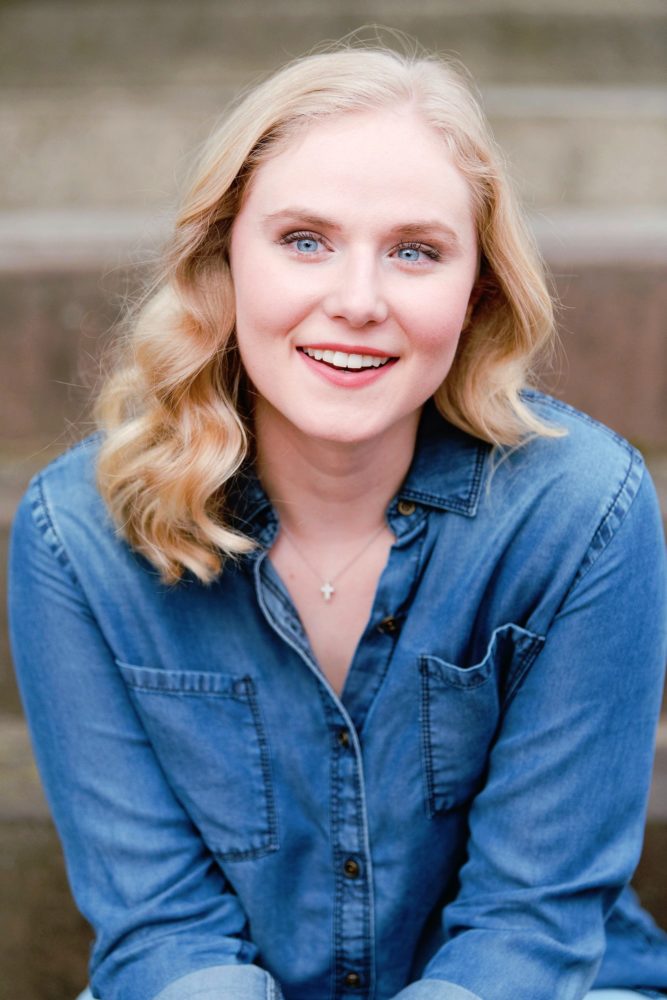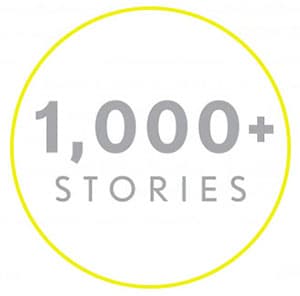
Editor’s Note: ReBokeh Vision Technologies has been named to The Story Exchange’s 2023 list of 10 Brilliant Business Ideas.
Rebecca Rosenberg, who was only a few months old when she was diagnosed with a rare disorder called oculocutaneous albinism, knows firsthand the challenges that come with navigating vision impairment. When she was in school, she recalls being offered several assistive technologies that failed to fit her needs, including an “enormous, overhead-projector-like textbook enlarger.” In light of those experiences, Rosenberg founded ReBokeh Vision Technologies, a free app that helps users with vision impairments personalize how they see the world via a camera feed on their smartphones or tablets. The startup participated earlier this year in Techstars‘ accelerator program for inclusive companies. The Baltimore entrepreneur is working to bring more of her accessible tools to the nearly 25 million people in the U.S. who need them – “so that every person with a vision impairment can feel seen.”
Here’s our lightly edited Q&A with Rosenberg.
How is your business different from others in your industry?
ReBokeh is working very specifically for people with moderate, uncorrectable vision impairments — a disability population that has been totally unserved by the industry to date. Other assistive devices have been designed to totally replace vision by defaulting to things like text-to-speech. Technology like that is really important for those who have very minimal vision, but the reality is that almost every person with a vision impairment has some degree of functional vision that they want to be able to make the most of. That is where ReBokeh comes in — to help make the most of existing vision, instead of trying to replace it.
Tell us about your biggest success so far.
Our technology is currently in use in more than 90 countries all over the world, and our team consistently receives messages from users about how much ReBokeh helps them. We were also fortunate enough to be featured by BBC World News.
What is your top challenge and how have you addressed it?
Making sure we were building technology that was actually useful and that would do justice to the population we hoped to serve. To take on that challenge, the ReBokeh app spent over a year in beta with members of the low-vision community, and people who support them along their care pathway like optometrists and low-vision technology specialists. All the feedback we received during that time helped shape what ReBokeh is today. And we didn’t just do this once, we recently launched our See Suite Beta Program to sign on users who will continue to provide this feedback and help us make the technology better.
Any other business observations based on your personal experience?
Our society talks a lot about DEI (diversity, equity, inclusion) but almost always leaves out accessibility from the conversation. An example I like to discuss is the metric on how much venture funding goes to women. We all know it to be only about 2% – and while this is a sad metric, at least we are tracking it. On the other hand, there aren’t even metrics on how much venture funding goes to entrepreneurs with disabilities. Part of my goal, given my platform, is to bring awareness to accessibility and disability as integral parts of diversity conversations.
What is your biggest tip for other startup entrepreneurs?
As an entrepreneur, you are constantly gathering advice from the people around you — sometimes it’s advice you have asked for, and sometimes it isn’t – but it is almost always coming from people you respect. The challenge is when those pieces of advice conflict. One of the greatest assets you can have as you build a business is the ability to trust your own judgment and your ability to analyze conflicting information to make the best decision for your organization.
How do you find inspiration on your darkest days?
It’s important to recognize that everyone goes through difficult periods and there are few jobs that put you on the emotional rollercoaster quite like starting a company. It is all part of the journey that becomes the story of success later!
What is your go-to song to get motivated on tough days?
“This Is Me” from the movie “The Greatest Showman.”
Who is your most important role model?
Dr. Bonnie Swenor, the founder and Director of the Johns Hopkins Disability Health Research Center. She has been an incredible advisor to me and advocate for the low-vision and wider disability communities. ◼
This story has been updated with fuller responses since it was originally published.
Instagram: @ReBokehVision
Facebook: @ReBokehVision
Check out our Advice + Tips for entrepreneurs starting-up
Watch our latest videos
Subscribe to our podcast




